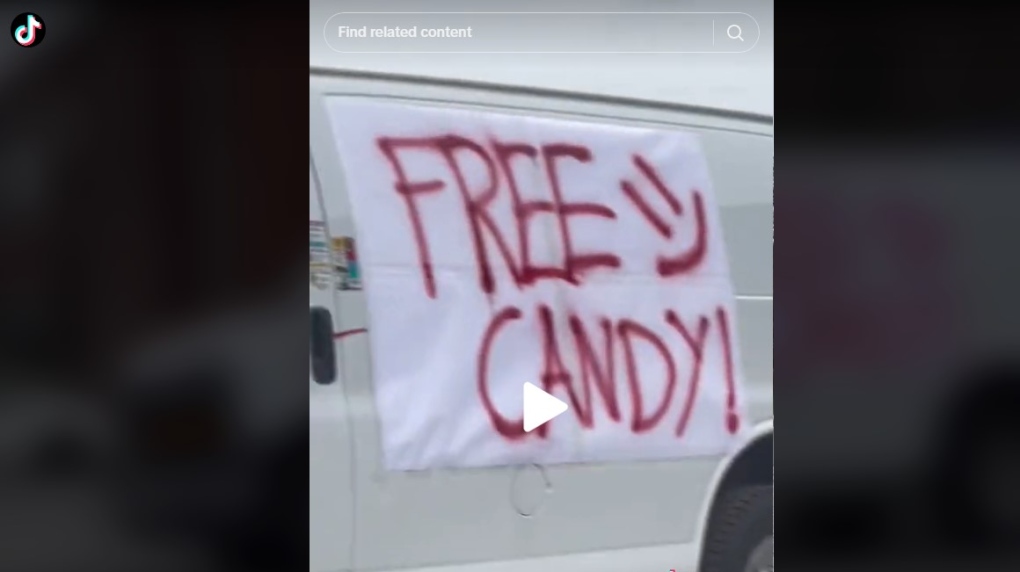Arrest of Quebec influencer in fake-crime case points to lack of social media education: expert
The arrest of a Quebec influencer who allegedly faked crimes to boost his popularity exposes the need for better education about social media and the law at a time when online figures are constantly pushing boundaries, one expert says.
On Wednesday, police in Gatineau, Que. charged 27-year-old Anthony Gagné with attempted public mischief. Their investigation started in May after someone complained about a person driving a rented white van with a banner that said "FREE CANDY" to attract children, police said in a news release.
Some of the influencer's most-viewed videos on TikTok show him performing various stunts with him "trying to get the FBI at my door."
Gatineau police allege Gagné, who has nearly 500,000 followers on the platform, posted these videos in order to gain more attention.
"We're always going to have people who push the narrative on social media … But when it comes down to it, we do actually need more education around how our criminal justice system, and our also our civil process of law, applies to individuals' use of social media," said Jesse Miller, a social media educator.
Social media literacy should start at the primary and secondary school level, he said, "so that individuals who are watching content on YouTube or watching it on TikTok aren't just believing that they can copycat or, when it comes down to it, plead ignorance of the law."
 A screenshot of a TikTok video showing a white van with "FREE CANDY" printed on it as it drove around a neighbourghood. (Source: TikTok.com)
A screenshot of a TikTok video showing a white van with "FREE CANDY" printed on it as it drove around a neighbourghood. (Source: TikTok.com)
Social media influencers have made headlines in the past after videos got them into trouble, including a group of Quebecers who filmed themselves partying on a flight to Cancun and a woman in Toronto who was arrested after throwing a chair off a balcony.
Other than financial deals from companies in exchange for content, internet "stardom" is the main driver for posting videos that push the envelope, according to Miller, founder of mediatedreality.com, a company based in Vancouver.
"It's the idea that anybody from their home can become a superstar," said Miller, adding that he wasn't surprised that Gagné was charged.
After finding the "FREE CANDY" video, police went through Gagné's online archive and found several other fake-crime videos.
"When investigators began to scrape through the social networks, they realized that Mr. Gagné had been making videos like this, with the same flavour, since 2021, with the goal of attracting attention. The majority of posts he published on social media were aimed at attracting police," Gatineau police Const. Patrick Kenney said an interview Thursday with The Canadian Press.
Gagné was released from custody on conditions, including that he stop posting content on social media platforms.
With a massive following, there is a tendency among some influencers to believe that because of their notoriety, they are immune from the law, but "the justice system is evolving to hold people accountable," according to Miller.
Gagné is due back in court on Sept. 25.
TikTok did not immediately respond to a request for comment on Thursday.
CTVNews.ca Top Stories

Trudeau asked Trump for California, Vermont to curb annexation talks
Justin Trudeau says U.S. president-elect Donald Trump kicked the tires on the potential annexation of Canada during their recent meeting in Florida, but the topic was quickly dropped when the prime minister countered with a request for two states.
Liberal leadership: Carney expected to launch bid next week, Clark organizing heavily, Gould considers entering
While longtime cabinet ministers Dominic LeBlanc and Melanie Joly have officially announced they have no plans to run for the Liberal leadership, several well-known faces are organizing behind the scenes to launch bids of their own.
BREAKING Two Alberta men sentenced for roles in 2022 Coutts border protest
Two Alberta men have been sentenced for their roles in the illegal Coutts border blockade in 2022.
Man dies after falling into sink hole at Fernie Alpine Resort
An investigation is underway by Elk Valley RCMP after a man died Wednesday after falling into a sink hole at Fernie Alpine Resort.
Amid tense backdrop, Canadian warship gets friendly message from Chinese vessel tracking movements
Daybreak on HMCS Ottawa began with a call over the marine radio from a Chinese warship. The call is coming from a Chinese Frigate known as the Yuncheng, the warship has been shadowing HMCS Ottawa through the South China Sea for two days and counting.
'Everything is gone': Sask. business owner loses Los Angeles home to wildfires
A Saskatchewan business owner lost her Los Angeles home as wildfires ravage parts of the city.
Trump gets no-penalty sentence in his hush money case, while calling it 'despicable'
U.S. president-elect Donald Trump was sentenced Friday to no punishment in his historic hush money case, a judgment that lets him return to the White House unencumbered by the threat of a jail term or a fine.
'Devastating beyond words': Paris Hilton shows remnants of home destroyed by L.A. fire
Socialite Paris Hilton shared a video showing her ravaged house, destroyed by the L.A. wildfires., 'I’m standing here in what used to be our home, and the heartbreak is truly indescribable,' Hilton wrote on Instagram.
Liberal leadership: Melanie Joly, Brian Gallant will not run, both focused on other matters
Foreign Affairs Minister Melanie Joly will not run for Liberal leadership. Up to now, Joly was widely considered a potential successor to Prime Minister Justin Trudeau. Former premier of New Brunswick Bran Gallant also confirmed to CTV News that he will not be in the running for Liberal leader.


































